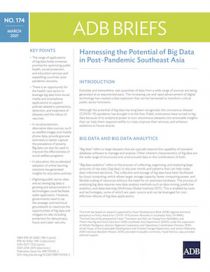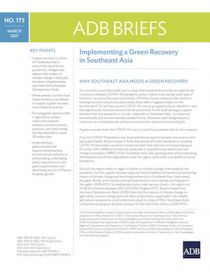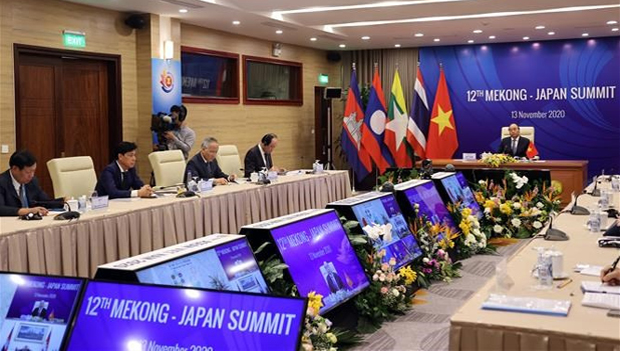
Harnessing the Potential of Big Data in Post-Pandemic Southeast Asia
This brief explains how big data can be utilized in Southeast Asia to boost public service delivery and expedite the coronavirus disease (COVID-19) recovery.
The Asian Development Bank approved the technical assistance Strengthening Regional Health Cooperation in the Greater Mekong Subregion – Phase 2 on 2 December 2024. This technical assistance supports the implementation of the new GMS Health Cooperation Strategy 2024-2030. Strengthening regional health cooperation will help realize a healthy and sustainable GMS community. The project aims to achieve this through three outputs: (i) operationalizing the strategic pillars of the new strategy; (ii) promoting and expanding knowledge support for regional health cooperation in the GMS; and (iii) strengthening operational support for the GMS Woking Group on Health Cooperation and its secretariat.
Phase 1 of the technical assistance, which concluded on 17 May 2024, established the GMS Working Group on Health Cooperation and its secretariat and developed the GMS Health Cooperation Strategy 2019–2023.
The GMS Regional Health Cooperation Strategy 2024-2030 emphasizes health issues that are regional in nature and require collective action to address. It has two strategic pillars: regional health security and health system strengthening toward universal health coverage.
Scaling Up One Health Approaches in the Greater Mekong Subregion provides an overview of One Health in the GMS and its relationship to addressing climate change. It details One Health activities in the subregion and recommends how they can be scaled up, including specific investment opportunities.
The GMS health agenda under the GMS Program Strategic Framework 2030 (GMS-2030) focuses on communicable disease control through cross-border surveillance and modeling, information exchange, implementation of international health regulations, and pandemic preparedness. Since universal health coverage is a critical regional public good, GMS-2030 aims to accelerate its implementation through strengthening the performance of GMS health systems to prevent, detect, and respond to public health threats such as COVID-19 and other emerging diseases; support countries to comply with the World Health Organization’s International Health Regulations; apply a unified approach to environmental, animal, and human health (“One Health”); strengthen protection of vulnerable communities and migrants; build capacity and cross-border cooperation to address priority health issues; and advance in gender equality to build subregional health cooperation leadership and decision-making policy.
Vision: Through collective efforts, the GMS Program aims to foster a healthy and sustainable GMS community, where the well-being of all citizens is pursued.
This vision is aligned with GMS-2030. Central to its attainment are two outcomes also aligned with the GMS-2030 and with the GMS-2030 Results Framework:
The GMS HCS 2024–2030 is underpinned by two pillars:
Strategic Pillar 1: Regional Health Security: The vulnerability of the GMS to health security risks is widely acknowledged. The GMS is particularly vulnerable to infectious diseases due to its high biodiversity, frequent human to animal interactions, and rapid urbanization, which facilitate the spread of zoonoses and other pathogens. Additionally, cross-border trade, intensive livestock farming, weak health systems, and environmental degradation further contribute to the region’s susceptibility to outbreaks and the rise of AMR; thus, it is critical for the GMS to align activities and technical areas that contribute to public health, preparedness, response, and resilience
Strategic Pillar 2: Health System Strengthening Toward Universal Health Coverage: Strengthening the health system with an emphasis on equity and resilience is vital for achieving Universal Health Coverage (UHC) and health security. This approach also supports broader socioeconomic advancement. According to UHC2030, it is the most effective and sustainable way to meet UHC and health security objectives. GMS-2030 aims to accelerate the implementation of UHC offering a chance for increased and more targeted investments in the core elements of health systems, particularly primary health care (PHC). Service accessibility, availability, and individual acceptability play important roles in facilitating or hindering vulnerable populations, including older people’s access to health care services. Addressing these factors is crucial for achieving UHC, since it ensures everyone—regardless of their vulnerabilities—can receive the health services they need without facing financial hardship. By prioritizing the unique needs of these groups, health systems can reduce disparities, improve health outcomes, and promote equity, ultimately leading to a more inclusive and resilient health care system.
The GMS HCS 2024–2030 will guide programming, foster innovation, increase engagement with the development and private sector partners, and mobilize new financing to support its implementation. In addition to its two strategic pillars, Its crosscutting themes are gender, climate change, and digital health.
The 5-year strategy focused on three strategic pillars: (1) health security as a regional public good, (2) health impacts of connectivity and mobility, and (3) health workforce development.
Established under the Asian Development Bank (ADB)-funded technical assistance Strengthening Regional Health Cooperation in the Greater Mekong Subregion – Phase 1 in 2019, the GMS Working Group on Health Cooperation (WGHC) serves as a platform for addressing regional health challenges. It facilitates dialogue and supports the development of policies, strategies, and programmatic responses. WGHC operationalized, governed, and institutionalized the GMS Health Cooperation Strategy (HCS) 2019–2023, with nominated representatives from the six countries, terms of reference, and reporting systems endorsed by the respective health ministers
Approved by ADB on 2 December 2024, this technical assistance supports the implementation of the new GMS HCS 2024-2030. Strengthening regional health cooperation will help realize a healthy and sustainable GMS community. The project aims to achieve this through three outputs: (i) operationalizing the strategic pillars of the new GMS HCS 2024-2030; (ii) promoting and expanding knowledge support for regional health cooperation in the GMS; and (iii) strengthening operational support for the GMS WGHC and its secretariat.
This technical assistance, approved by ADB on 22 August 2018 and concluded on 17 May 2024, supported the establishment of the GMS Working Group on Health Cooperation and its secretariat and supported annual meetings of the WGHC; developed the (a) GMS Health Cooperation Strategy 2019–2023, and (b) GMS Health Cooperation Strategy 2024–2030; supported annual meetings of the GMS WGHC and annual health cooperation workplans; produced knowledge products, including on migration, health, and One Health; and yielded six new GMS health sector investment projects.
Focal Persons at the Asian Development Bank
Rikard Elfving
Human and Social Development Sector Office
Sectors Group
Najibullah Habib
Human and Social Development Sector Office
Sectors Group
Other Concerned Staff & Consultants
Asadullah Sumbal
Regional Cooperation and Integration Unit
Southeast Asia Department
Rowena Sancio
Regional Cooperation and Integration Unit
Southeast Asia Department/GMS Secretariat
Send inquiries to GMS Secretariat.

This brief explains how big data can be utilized in Southeast Asia to boost public service delivery and expedite the coronavirus disease (COVID-19) recovery.

This brief outlines how Southeast Asia can focus on green growth to successfully and sustainably recover from the coronavirus disease (COVID-19) pandemic.
The Asian Development Bank (ADB) and its partners will collectively zero in on strategies and policy responses that countries can adopt to lay the groundwork for post-COVID-19 recovery at the upcoming Southeast Asia Development Symposium (SEADS) Innovation through Collaboration: Planning for Inclusive Post-COVID-19 Recovery.
The region’s success with decades of growth and poverty reduction is due in large part to the international movement of trade, capital, people, knowledge, and resources – not only within the region but with the rest of the world. This type of regional cooperation is also a powerful tool in addressing the pandemic.
Cambodia, Lao PDR, and Viet Nam (CLV) Leaders expressed their firm commitment to strengthen the CLV Development Triangle Area (DTA) in order to accelerate economic growth, alleviate poverty, and promote socio-cultural progress in the subregion. At the 11th CLV Summit held online on 9 December, they adopted a Joint Declaration that provides a foundation for the subregion’s socio-economic development plan until 2030 and the Tourism Development Plan. They also adopted the Development Plan for Sustainable Rubber Industry.
Leaders of Cambodia, Lao PDR, Myanmar, Thailand, and Viet Nam adopted the Phnom Penh declaration at the 9th Ayeyawady-Chao Phraya-Mekong Economic Cooperation Strategy (ACMECS) Summit held on 9 December. The declaration emphasizes post-pandemic socio-economic recovery and preparation for future crises and challenges through public health cooperation and enhanced supply chains. ACMECS leaders stressed the importance of vaccine multilateralism to ensure equitable and safe access to coronavirus disease (COVID-19) vaccines.
The 8th Mekong–Republic of Korea (RoK) Business Forum acknowledged how the RoK and the Mekong countries sustained their trade to 2019 levels amid the pandemic by upholding their trade relations. The Forum was held on 4 December in-person in Hanoi, Viet Nam, and online.
The 24th GMS Ministerial Conference (MC-24) was held on 4 November 2020 with the theme “Pave the way to a more integrated, inclusive, sustainable and prosperous GMS.”
The 11th Economic Corridors Forum (ECF-11) was held on 28 October 2020 with the theme “Boosting Competitiveness, Connectivity, and Community in the Greater Mekong Subregion (GMS) Economic Corridors through Focused and Integrated Spatial Development.”

The 12th Mekong-Japan Summit took place virtually on 13 November as part of the 37th ASEAN Summit and Related Summits. Photo by VNA via VNExplorer.
Japan and Mekong countries convened the 12th Mekong-Japan Summit on 13 November, cochaired by Japan Prime Minister Suga Yoshihide and Viet Nam Prime Minister Nguyen Xuan Phuc. The meeting underscored Japan’s strong commitment to the Mekong subregion and reviewed progress of cooperation between Japan and Mekong countries (Cambodia, Lao People’s Democratic Republic [PDR], Thailand, Myanmar, and Viet Nam) as guided by the "Tokyo Strategy 2018." The Strategy seeks to strengthen connectivity, improve human resource development, and enhance environmental protection.